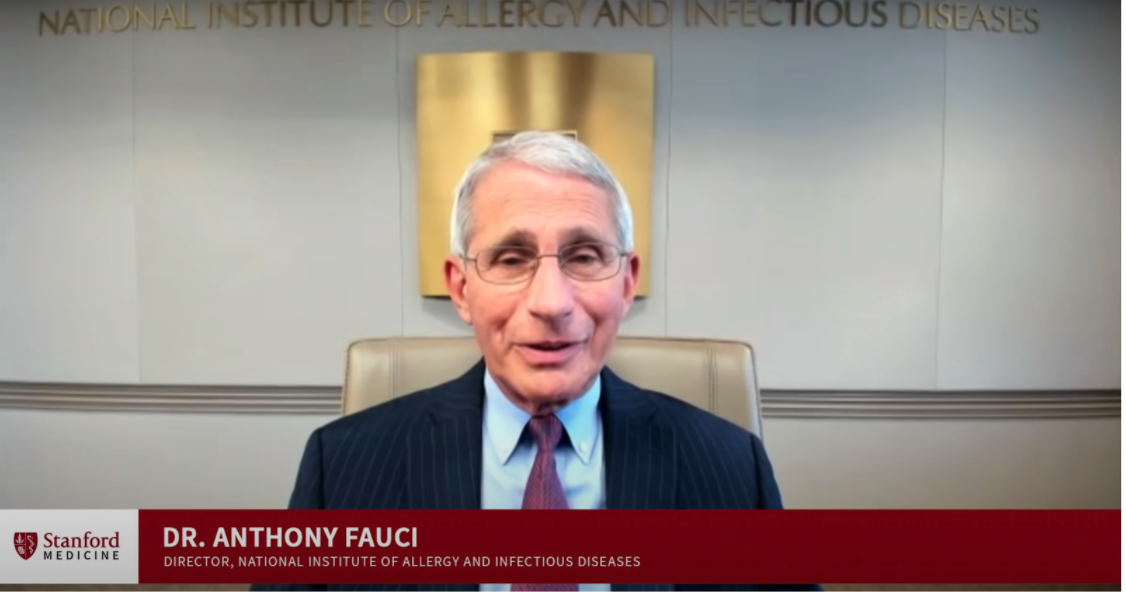Stanford Medicine’s Dean Lloyd Minor hosted a virtual fireside chat with Dr. Anthony Fauci, leading infectious disease expert and prominent member of the White House’s COVID-19 task force. Fauci has studied and advised past presidents on a host of epidemics including HIV/AIDS, avian flu and Ebola, but on Monday he called the current pandemic “the most challenging public health crisis” he has ever dealt with in his six decades of experience. Despite a grim evaluation of the pandemic’s spread, Fauci expressed cautious optimism for a vaccine by the end of the year or early 2021.
“We did not shut down entirely, and that’s the reason why [the number of cases] went up, started to come down and we plateaued at a level that was really quite high [at] about 20,000 infections a day,” Fauci said, and if you don’t handle the initial surge well, “what you’ll see is what you’re seeing right now.”
Though the U.S. saw the number of cases decline from late-April to June, states began to reopen while the number of cases were still considerably high, leading to the current rise in infections, Fauci said.
“It is very clear, and we know this from countries throughout the world, that if you physically separate people to the point of not allowing the virus to transmit,” we can control the spread of the virus, Fauci said.
Just shortly after the fireside chat ended, Gov. Gavin Newsom ordered restaurants, movie theaters, bars and more to close statewide, and for other indoor activities across 30 counties to shut down. During the talk, Fauci noted that he has been working closely with Newsom throughout the past few months, and that the Bay Area counties are doing “relatively better” than others in southern California.
“So you’ve got to shut down but [then] gradually open,” Fauci said. “We made a set of guidelines a few months ago. We had checkpoints. Then you would have phase one, phase two [and] phase three.”
Instead, Fauci said, some states reopened earlier than he believes they should have, and many are now considering having to close again.
There are additional things you can do now such as physically distancing, wearing a mask, avoiding crowds and washing hands, Fauci said, and “those things, as simple as they are, can turn it around, and I think we can do that.”
Minor later asked how clinical trials have evolved and what should be “tweaked.” Fauci noted that a major misconception surrounding clinical trials of vaccines is that vaccine research shouldn’t be done during a pandemic.
“The best research you can do is in the middle of an outbreak because you want to help the people who are experiencing the outbreak, but you want to learn from it so that you can help that many more,” Fauci said, adding that researchers disproved the assumption that you shouldn’t do research during an outbreak with Ebola in 2014.
“We did randomized placebo-controlled trials [and] we proved a couple of therapies worked,” he said. “A vaccine was developed for Ebola, and now already with COVID-19, two drugs were proven by a randomized placebo controlled trial to have definitely shown to be beneficial in advanced disease. So clinical research and clinical research infrastructure [are] very important [parts of] the response [to] outbreaks.”
To answer Minor’s question about how hopeful Fauci is regarding therapeutics, Fauci said he was being “cautiously optimistic” that scientists will successfully create one, or hopefully more, vaccines by the end of the year or the beginning of 2021.
“What we really need — and we’re on the track of getting them — are interventions that can be given early in the course of the disease to prevent people who are vulnerable from progressing to the requirement for hospitalization,” Fauci said. “Those are direct, antiviral drugs … As you know, there are multiple candidates that are in various stages of clinical trial. One or two of them will go into phase three for efficacy literally at the end of this month.”
Fauci also added that specific measures and changes have been implemented in the process of distribution of future vaccines. Companies that are involved with the federal government in producing the vaccines are committed to start producing “large numbers of doses of the vaccine even before it’s definitely proven to be safe and effective,” despite the risk that these companies may lose a substantial amount of money if the vaccines aren’t successful.
“Obviously, you ultimately want to vaccinate everybody [but] you’re going have to prioritize,” Fauci said. “And that’s where you put together committees of people who understand vaccinology, community representatives and, above all, ethicists who can make sure your decisions about distribution are based on ethical principles of justice and fairness.”
Stanford was one of the “first academic medical centers in the US. to develop its own diagnostic test,” helping to make testing available in northern California, according to Minor, and Fauci added that academic medical centers and the next generation of physician-scientists can play a significant role in handling the outbreak, and future public health crises.
Fauci ended the conversation by reminding the public to “not only think about your personal responsibilities, but your societal responsibilities” because of the chances of infecting those around us unintentionally, particularly those who are most vulnerable.
Contact Leanna Sun at leannaxsel ‘at’ gmail.com.
